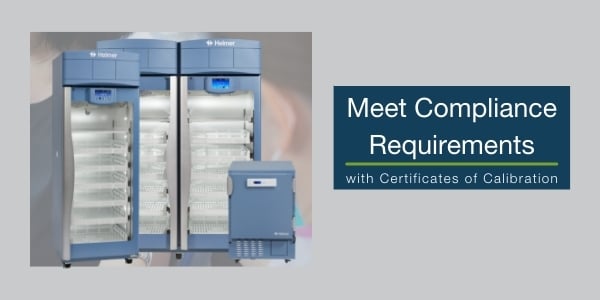
For vaccine storage providers, having a valid Certificate of Calibration is necessary in order to meet CDC and Vaccines for Children guidelines. Having an accurate certificate can also help providers and facilities meet third-party audits and compliance reviews.
The CDC stresses that vaccine providers document accurate temperature history, which reflects actual vaccine temperatures, and recommends providers use a Digital Data Logger (DDL) to do so. Additionally, the CDC recommends using a calibrated temperature monitoring device with a Certificate of Traceability and Calibration Testing (also referred to as a Report of Calibration).
According to the CDC, a DDL’s Certificate of Calibration Testing should include:
- Model/device name or number
- Serial number
- Date of calibration (report or issue date)
- Confirmation the instrument passed testing (or instrument is in tolerance)
- Recommended uncertainty of +/-0.5° C (+/-1° F) or less
Calibration and traceability testing is performed by a laboratory with accreditation from the International Laboratory Accreditation Cooperation (ILAC) Mutual Recognition Arrangement (MRA) signatory body, which assures testing performed meets appropriate standards. Additionally, providers should check the below criteria to determine if their DDL was issued by an appropriate entity:
- Conforms to International Organization for Standardization (ISO)/International Electrotechnical Commission (IEC) 17025 international standards for calibration testing and traceability
- Traceable to the standards maintained by the National Institute of Standards and Technology (NIST)
- Meets specifications and testing requirements for the American Society for Testing and Materials (ASTM) Standard E2877 Tolerance Class F or higher
- Refers to another acceptable accuracy validation method, such as comparison to other traceable reference standards or tests at thermometric fixed points
Providers are responsible for maintaining up-to-date certificates of calibration. The CDC recommends calibration testing every two to three years, or to the manufacturer’s suggested timeline. VFC providers should consult their local immunization program manager for their required time frame for calibration testing.
OTHER BLOGS YOU MIGHT BE INTERESTED IN...
- 5 Tips for Ensuring Vaccine Storage Safety
- Vaccine Storage Safety and the Importance of Routine Maintenance
- CDC Vaccine Storage: Helping you Meet the Guidelines
- Medical-grade vaccine storage can help prevent vaccine and financial loss
For more on the safe storage of vaccines, read our vaccine storage guide.




